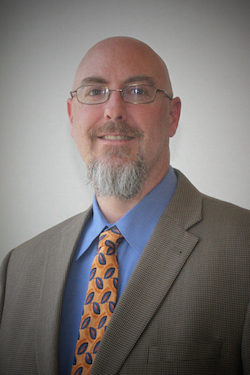Political Science Professor Studies Civil War, Insurrection and Politics in Central America

For University of Scranton Political Science Professor Michael Allison, Ph.D., the fascination with Latin American insurgent groups and politics has followed him through many of his own chapters in life, well before he became a respected scholar in the field.
While in elementary school in Queens, New York, Dr. Allison would often walk by a plaque in the school’s hallway for Sister Maura Clarke, who attended the same school years earlier, but was killed along with three fellow missionaries by the Salvadoran National Guard in 1980. “We were from the same community and that was something that was always kicking around in the back of my head as I got older,” Dr. Allison recalled.
Later, at the Jesuit-run Regis High School in New York City, he and other students learned of the murder of six Jesuit priests at the Jesuit University of Central America by the Salvadoran Army in 1989.
These experiences and others spurred his interest in Central America, crystallizing in a Fulbright-sponsored trip to El Salvador after earning his bachelor’s degree in politics from Fairfield University in 1996. During the Fulbright trip, he researched the development of postwar political parties, volunteered as an international election observer, and taught English language classes to former guerrillas.
Since earning his master’s degree in 2001 and a Ph.D. in 2006 in political science from Florida State University, Dr. Allison has greatly honed his expertise and scholarship, focusing particularly on the transition of rebel groups to political parties in Guatemala, El Salvador and Nicaragua. He has carved a unique niche in the political science discipline, one that also has involved comparative studies of civil war and civil war resolution in Latin America, as well as U.S. and international influence in the region’s affairs.
One thread of his research has involved identifying the factors that enable rebel groups to successfully transition into viable political parties in these fragile representative democracies, which despite being freed from the oppressive shackles of their dictatorial past are still overridden with government corruption and pervasive class inequities.
In the past, many of these rebel groups sought to overthrow authoritarian regimes. Today, however, they are fighting their battles through the traditional means and levers of democratic government: increasing their stature and influence through soft power (courting public approval/opinion; developing party platforms; acquiring votes) rather than through hard power (armed conflict; physical coercion).
“For most of them, it’s been 20 years since they were active guerrillas in the mountains,” Dr. Allison said. Now some are elected officials, civil servants, university professors and human rights advocates.
His research has found that it is rarely ever a smooth and simple transition from guerrilla to political party. Gaining political stature and power has been a story of mixed success. In a paper published in July in the Journal of Latin American Studies, Dr. Allison discovered that none of the parties that broke off from the major revolutionary (and now politically transitioned) groups – the Sandinista National Liberation Front of Nicaragua, Farabundo Martí National Liberation Front of El Salvador, and the Guatemalan National Revolutionary Unit – were successful in developing their own separate political parties.
Similarly, in a paper published in Democratization in April, Dr. Allison examined why the Guatemalan National Revolutionary Unit has been “unable to capture more than four percent of the vote, on its own or in coalition, leaving it a minor political party.” Organizational and institutional factors contributed to its poor performance, he found. For the paper, he conducted fieldwork in Guatemala, supported by a Fulbright U.S. Scholar grant he was awarded for the project.
In September, Dr. Allison presented a paper at the American Political Science Association’s annual meeting in Philadelphia. There, he discussed the relations and interactions among the three major revolutionary groups in El Salvador, Nicaragua, and Guatemala from the 1960s up to their transition to political organizations. Their interactions and affiliations were instrumental in helping achieve revolutionary victory in Nicaragua and a military stalemate in El Salvador. Since his 1997 Fulbright trip to El Salvador, he has interviewed numerous participants in those countries’ civil wars. To acquire greater insight and context for the paper, he interviewed former guerrillas in Guatemala in 2013 and in El Salvador in 2015.
Despite the progress since the revolutionary fervor of the Cold War era, the region is still healing from the wounds of civil war and decades of pervasive violence that deeply afflicted every rung of society.
“In Guatemala, the guerrillas are disappointed with the development of the government’s political system after the war,” he said. “Many of them fought for a decade or two, up in the mountains, fighting for a better life. They negotiated a lot of agreements, but many of the agreements were not implemented. In El Salvador, it’s a bit different. Their party won the presidency in 2009 and 2014.”
Yet even in the aftermath of those victories and apparent political stabilization, many of the issues that inflamed the violence decades ago linger. “Now you have a better framework to discuss the problems,” Dr. Allison said, “But what happened 20, 30 years ago still resonates and has an important impact on what’s going on in the region today.” For example, the failure to resolve the social, economic and political roots of the civil wars through peace agreements helps to explain today’s refugee crisis in Central America.
Dr. Allison, who serves as chair of the Political Science Department, also coordinates The University’s Education for Justice program. His work has appeared in Latin American Politics and Society, Studies in Comparative International Development, Conflict Management and Peace Science, The Latin Americanist and various edited volumes. He is also frequently quoted in the media, offering his thoughts on U.S. – Latin American relations and Central American affairs.
Follow him on Twitter @CentAmPolMike or follow his blog at centralamericanpolitics.blogspot.com.






